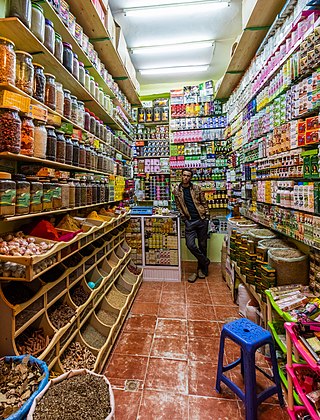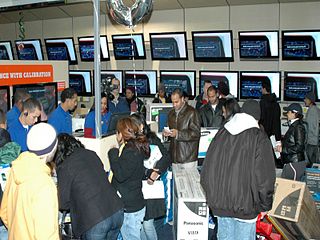
Retail is the sale of goods and services to consumers, in contrast to wholesaling, which is sale to business or institutional customers. A retailer purchases goods in large quantities from manufacturers, directly or through a wholesaler, and then sells in smaller quantities to consumers for a profit. Retailers are the final link in the supply chain from producers to consumers.

Consumer electronics or home electronics are electronic equipment intended for everyday use, typically in private homes. Consumer electronics include devices used for entertainment, communications and recreation. Usually referred to as black goods due to many products being housed in black or dark casings. This term is used to distinguish them from "white goods" which are meant for housekeeping tasks, such as washing machines and refrigerators, although nowadays, these would be considered black goods, some of these being connected to the Internet. In British English, they are often called brown goods by producers and sellers. In the 2010s, this distinction is absent in large big box consumer electronics stores, which sell entertainment, communication and home office devices, light fixtures and appliances, including the bathroom type.

The Union of Shop, Distributive and Allied Workers (Usdaw) is a trade union in the United Kingdom, consisting of around 360,000 members. Usdaw members work in a variety of occupations and industries including: shopworkers, factory and warehouse workers, drivers, call centres, clerical workers, milkround and dairy process, butchers and meat packers, catering, laundries, chemical processing, home shopping and pharmaceutical. The retail sector employs around 2.77 million people.
The United Kingdom's Climate Change Programme was launched in November 2000 by the British government in response to its commitment agreed at the 1992 United Nations Conference on Environment and Development (UNCED). The 2000 programme was updated in March 2006 following a review launched in September 2004.

Online shopping is a form of electronic commerce which allows consumers to directly buy goods or services from a seller over the Internet using a web browser or a mobile app. Consumers find a product of interest by visiting the website of the retailer directly or by searching among alternative vendors using a shopping search engine, which displays the same product's availability and pricing at different e-retailers. As of 2020, customers can shop online using a range of different computers and devices, including desktop computers, laptops, tablet computers and smartphones.
Sonae is a multinational business group based in Maia, Porto District, Portugal. It is present in 90 countries, operating in several sectors, including retail, financial services, shopping centres management, software and information systems, media and telecommunications.

Category management is a retailing and purchasing concept in which the range of products purchased by a business organization or sold by a retailer is broken down into discrete groups of similar or related products; these groups are known as product categories. It is a systematic, disciplined approach to managing a product category as a strategic business unit. The phrase "category management" was coined by Brian F. Harris.
Domestic housing in the United Kingdom presents a possible opportunity for achieving the 20% overall cut in UK greenhouse gas emissions targeted by the Government for 2010. However, the process of achieving that drop is proving problematic given the very wide range of age and condition of the UK housing stock.
Various energy conservation measures are taken in the United Kingdom.

CrossIron Mills is a fully enclosed shopping centre development just outside the northern city limits of Calgary, Alberta, Canada, and immediately east of the hamlet of Balzac in Rocky View County. It was developed by Ivanhoé Cambridge, a major Canadian real estate company. Completed in August 2009, the mall is the largest single-level shopping centre in Alberta, containing approximately 109,440 m2 (1,178,000 sq ft) of retail and entertainment space. Century Downs Racetrack and Casino is close by to the east.
The Code for Sustainable Homes was an environmental assessment method for rating and certifying the performance of new homes in United Kingdom. First introduced in 2006, it is a national standard for use in the design and construction of new homes with a view to encouraging continuous improvement in sustainable home building. In 2015 the Government in England withdrew it, consolidating some standards into Building Regulations.
The CRC Energy Efficiency Scheme was a mandatory carbon emissions reduction scheme in the United Kingdom which applied to large energy-intensive organisations in the public and private sectors. It was estimated that the scheme would reduce carbon emissions by 1.2 million tonnes of carbon per year by 2020. In an effort to avoid dangerous climate change, the British Government first committed to cutting UK carbon emissions by 60% by 2050, and in October 2008 increased this commitment to 80%. The scheme has also been credited with driving up demand for energy-efficient goods and services.

The Eugene Green Energy Standard was an international standard to which national or international green electricity labelling schemes could be accredited to confirm that they provide genuine environmental benefits. It was designed to encourage the generation and use of additional renewable energy sources for electricity generation, although the limited use of additional natural gas-fired cogeneration plant was also supported. Initially funded in part through the EU's clean-e programme, but also including some participants from outside Europe, the Eugene standard was formally discontinued after February 2009.
Future Energy is a former accreditation scheme for green electricity in the United Kingdom, designed to support and stimulate electricity generation from renewable energy sources. The scheme was launched in 1999 and was operated by the Energy Saving Trust until funding expired in 2002.

The availability and uptake of green electricity in the United Kingdom has increased in the 21st century. There are a number of suppliers offering green electricity in the United Kingdom. In theory these types of tariffs help to lower carbon dioxide emissions by increasing consumer demand for green electricity and encouraging more renewable energy plant to be built. Since Ofgem's 2014 regulations there are now set criteria defining what can be classified as a green source product. As well as holding sufficient guarantee of origin certificates to cover the electricity sold to consumers, suppliers are also required to show additionality by contributing to wider environmental and low carbon funds.

The Bemis Manufacturing Company is an American manufacturing company based in Sheboygan Falls, Wisconsin, and is best known for its toilet seat products. Bemis also manufactures plastic lawn, commercial, and indoor furniture, suction canisters, sharps containers, fluid management systems, gas caps, gauges and various contracted extrusion and injection molded plastic parts for companies such as John Deere and Whirlpool Corporation. The company is a pioneer of co-injection molding, a process in which virgin resin is injected with scrap plastic.

Retailing in India is one of the pillars of its economy and accounts for about 10 percent of its GDP. The Indian retail market is estimated to be US$ 600 billion and one of the top five retail markets in the world by economic value. India is one of the fastest growing retail markets in the world, with 1.2 billion people.
Domestic sourcing is the activity of contracting for goods or services that are delivered or manufactured within the buyer's home country borders. Domestic sourcing is becoming central to the discussion of "Buy American" or the protectionist debate that is being discussed at the highest levels of all major countries. This debate is becoming particularly acute with the unemployment rate in the US rising above 8% nationally and now impacting more white collar jobs or service industry jobs.

The economics of Christmas are significant because Christmas is typically a high-volume selling season for goods suppliers around the world. Sales increase dramatically as people purchase gifts, decorations, and supplies to celebrate. In the U.S., the "Christmas shopping season" starts as early as October. In Canada, merchants begin advertising campaigns just before Halloween, and step up their marketing following Remembrance Day on 11 November. In the UK and Ireland, the Christmas shopping season starts from mid November, around the time when high street Christmas lights are turned on. In the United States, it has been calculated that a quarter of all personal spending takes place during the Christmas/holiday shopping season. Figures from the U.S. Census Bureau reveal that expenditure in department stores nationwide rose from $20.8 billion in November 2004 to $31.9 billion in December 2004, an increase of 54 percent. In other sectors, the pre-Christmas increase in spending was even greater, due to a November through December buying surge of 100% in bookstores and 170% in jewelry stores. In the same year employment in American retail stores rose from 1.6 million to 1.8 million in the two months leading up to Christmas. This means that while consumers might spend more during this season, they also are given increased employment opportunities as sales rise to meet the increased demand.

The COVID-19 pandemic affects the global fashion industry as governments close down manufacturing plants, and through store closures, and event cancellations to slow the spread of the virus. The coronavirus pandemic has had a major impact on fashion brands worldwide. At the same time, the fashion industry faces challenges in consumer demand. New opportunities are also presenting themselves as fashion brands shift to making fashionable coronavirus face masks. The ongoing COVID-19 pandemic is inevitably changing the fashion world forever. Domenico de Sole, chairman of Tom Ford International, remarked that “I have seen a lot of difficult situations in my long career and this has been the most devastating event, not just for fashion and luxury, but all industries.”












